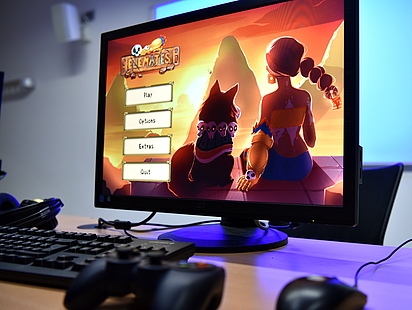Media informatics and interactive entertainment, M. Sc.
| Faculty | Applied Computer Sciences and Biosciences |
|---|---|
| Course of studies | Media Informatics and Interactive Entertainment |
| Degree | Master |
| Academic degree | Master of Science |
| Start | Winter semester |
| Regular study period | 4 Semesters |
| Category |
computer science media |
| Type of study |
full-time studies |
| Course language | german |
| Admission restriction | No |
| Tuition | No |
| Credits | 120 |
| Accredited | No |
| Application portal |
Online application |
Curriculum
The Master program comprises four semesters and includes in the first year the theoretical and practical development of specialized knowledge and related advanced methods, which will be consolidated and adapted during the second year.
In the first two semesters, various compulsory subjects and qualification lines are offered. From the qualification lines, three have to be completed with the corresponding modules. The research internship in the third semester can be completed at the university or in a company or abroad and is supplemented by appropriate seminars. This is followed by the master's project in the fourth semester. Every student must take at least 30 credits per semester.
The studies focus on the the field of Creative Interaction Science, the development of interdisciplinary knowledge, the digitization of teaching content, and the application of sound scientific knowledge.
In combination with the selection of qualification lines, the students receive specialist skills in the following areas:
- Game Production: Competencies in the field of automation, evaluation, player interaction, and proceduralization in the area of commercial game production.
- VFX-Production: Includes all professional tasks in the field of visual effects for film, games, and advertising.
- Web development: Complex systems with the main focus on cloud, virtualization, Internet of Things, and simultaneous usability and comprehensibility by multiple users.
- Interactive data analysis and Deep Learning: Application of artificial intelligence in games and for data analysis in mixed reality for research and industry (autonomous driving, automated and optimized production lines, robot control).
- Game Engine development: The ability to evaluate and adapt available frameworks for digital games (game engines) on the market or to implement in-house developments.
- IT-Governance: Gives an insight into current developments in the field of blockchain technologies and discusses ethical aspects in the field of digitization.
Career prospects
After graduating, students of the master's program can autonomously develop both analytical and creative solutions in the field of media informatics and interactive entertainment.
On the one hand, this includes training as a Media computer scientist 4.0, which combines areas of classical computer science with modern content and presentation/interaction options of Web 4.0. On the other hand, for example, creative skills for the design, testing and balancing of games are coupled with various cutting-edge information technologies. You can thereby expect to be able to optimize aspects of development, production, control processes, and the experience of immersion in virtual and augmented reality.
In addition, this includes the use and adaptation of state-of-the-art methods of artificial intelligence and deep learning to various areas of application in research and industry in large amounts of data (big data). Specialists in this field have experienced a very high demand in recent years.
Furthermore, graduates have developed their individual skills and potential in the fields of soft skills and knowledge development in interdisciplinary fields. Through joint projects and practical research, they are able to fill specialist and managerial positions or to work independently in their own company.
Occupational fields and priorities include:
- Mediacomputer scientist 4.0
- Development, design, and balancing of games
- Designer in 2D / 3D and Animation
- Specialist for professional visual effects (VFX)
- Design and development of human-machine interfaces
- Development of multimedia and e-learning content
- Development of Web content management systems
- Development of mobile applications
- Development of complex database and software systems for digital media
- Multimedia Information Retrieval, Data Scientist
- Application of artificial intelligence for data analysis in big data
- Project Manager as well as IT and Games Consultant
Admission requirements & Application
Information about admission, German language courses , costs of living, and application forms are available at our web page, here:
Contact for international applicants
Application Service - Bewerberservice
Mrs. Simone Natzschka
Technikumplatz 17
09644 Mittweida
Germany
Fax: +49 3727 58-21269
E-mail: application@hs-mittweida.de
Phone: +49 3727 58-1269
Application deadline for the winter semester is May 15. We also accept late applications if there are spaces available in the programme, and if - based on our experience - there is a chance for the applicant to arrive on time for the studies.
Course objective
Immersive games are increasingly evolving into realistic learning platforms with high market potential. Workflows are recorded in the course of digitization and increasingly automated by methods of artificial intelligence. The media computer scientist of the future must be able to tap into the latest technologies, apply them and adapt them if necessary.
On the technical side, the master's program focuses on communicating current principles of Web 4.0, methods of artificial intelligence with software engineering for complex systems, and databases for digital media. The targeted application of the heterogeneous technologies involved requires a fundamental understanding of the underlying principles, which are developed in a practical way with the students through appropriate visualization and interaction methods, also with the help of gamification and virtual and augmented reality.
This is suitably complemented by the creative aspects of the degree program in competitive game design and balancing, as well as by procedural methods for the automatic generation of content or special effects, and finds interdisciplinary application in various student projects.
This enables the students to collaborate professionally in projects in the field of the entertainment industry or in complex software systems of knowledge and information management, or to design them.
